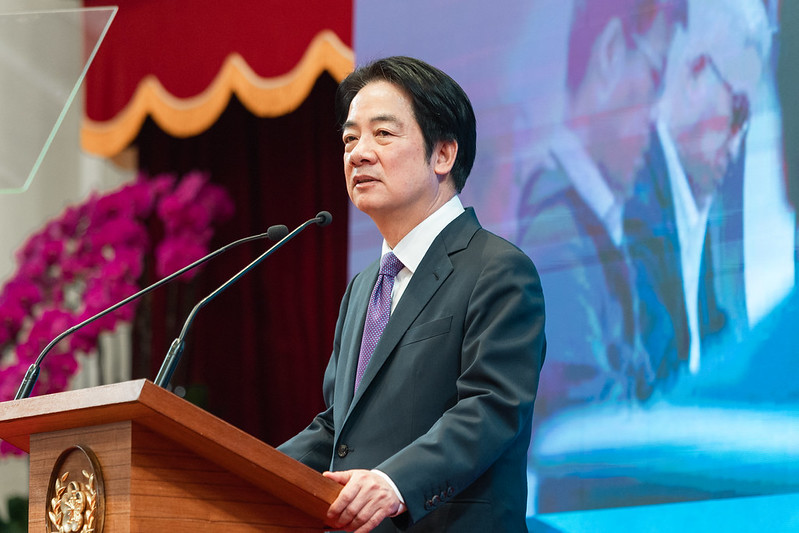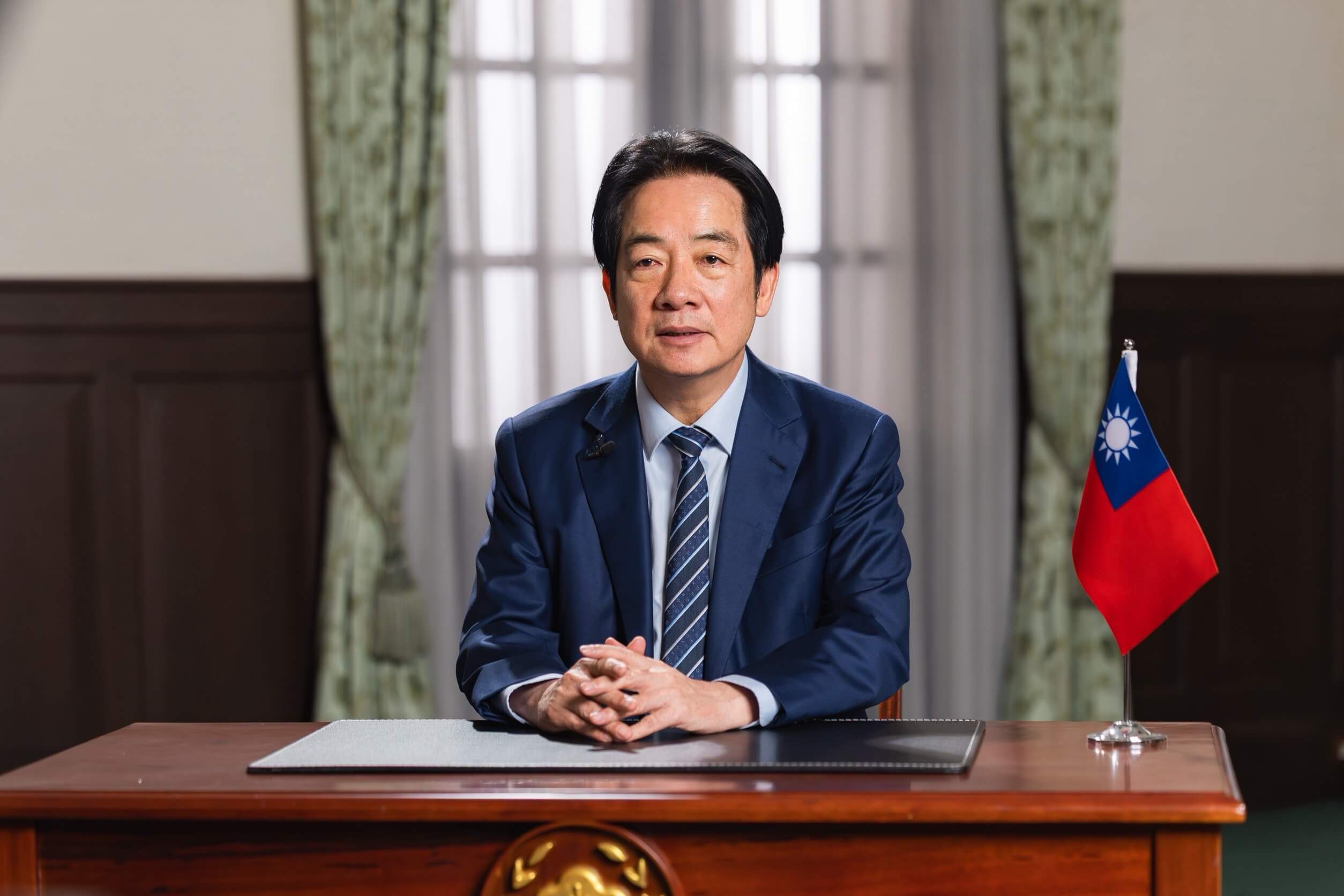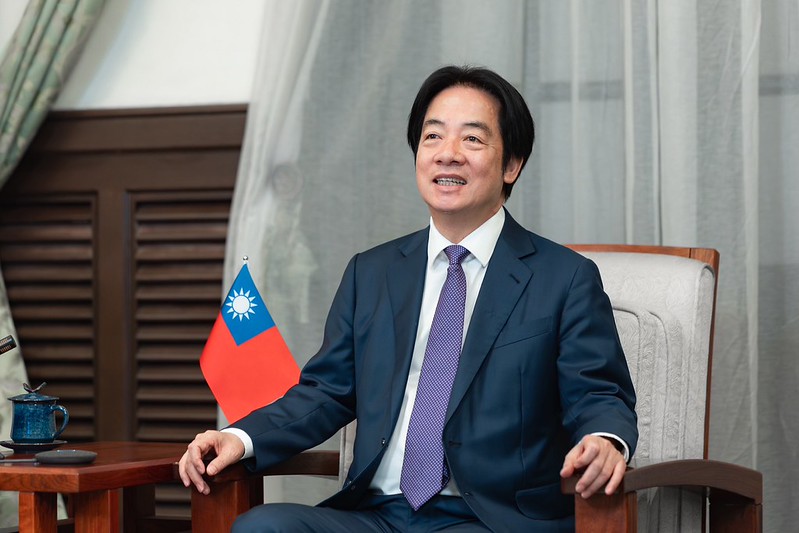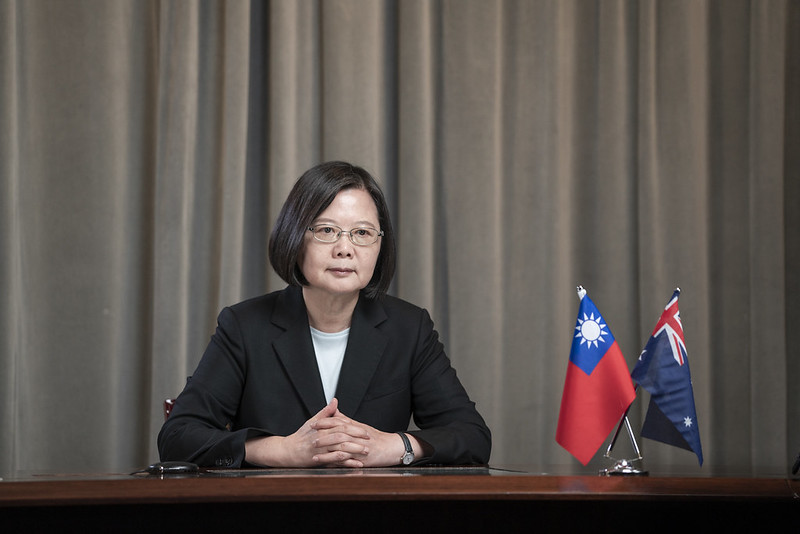News & activities
 News releases
News releases
President Tsai Ing-wen recently delivered a virtual address at the Indo-Pacific Leaders Dialogue session at the invitation of the Australian Strategic Policy Institute (ASPI), a think tank based in Canberra. She also fielded prepared questions from the participants.
The president pointed out that through cooperation and mutual assistance, Taiwan and Australia were able to weather the first wave of the COVID-19 outbreak. She expressed hope to begin negotiations for a Taiwan-Australia economic cooperation agreement in the very near future, so that we can uncover more opportunities that benefit both our countries. The president also looks forward to collaborating with Australia to maintain stability and peace in the region.
Referring to the passing of the "Hong Kong version of the National Security Law," President Tsai reiterated that we strongly support the people of Hong Kong's quest for democracy, freedom and human rights, and we commend our democratic allies, such as Australia and the United States, for taking action to support Hong Kong and safeguard democracy. She called on the international community to pay close attention to the potential hotspots of conflict in the East and South China Seas, and work together to resolve any issue or conflict peacefully.
A transcript of President Tsai's speech follows:
Participants of the "Pacific Leaders' Dialogue", and all those watching this live stream, good morning. It is wonderful to be with you all through the Internet.
I would like to begin my talk with a special thanks to the Australian Strategic Policy Institute for hosting this important event. It is my honor and pleasure to take part in the "Pacific Leaders' Dialogue" at a time when the Indo-Pacific Region is facing many significant challenges.
I will use today's opportunity to share with you Taiwan's perspectives in navigating through this critical time.
Taiwan-Australia Cooperation Overview
In recent years, the multifaceted relationship Taiwan and Australia share has grown even closer, propelled by our shared values of democracy and freedom.
Taiwan and Australia have found an increased number of issues and opportunities in education, tourism, trade, culture, science and security to collaborate in, resulting in mutually beneficial outcomes.
This year, Taiwan and Australia, like the rest of the world, are facing the challenges brought on by the COVID-19 pandemic. Once again, as democratic allies, we have found ways to assist each other under these most unfortunate circumstances.
For example, in March, as we dealt with a shortage of materials for epidemic prevention, Australia graciously offered Taiwan one million liters of alcohol to make more than four million bottles of 75%-alcohol sanitizer, while, in exchange, Taiwan provided three metric tons of non-woven fabric, the key raw material for surgical mask production.
It is because of this kind of mutual assistance, both Taiwan and Australia were able to weather the first wave of the COVID-19 outbreak.
At the same time, medical research teams from Taiwan's Chang Gung University and Australia's Monash University have been working together to develop a treatment for COVID-19, and have achieved positive results.
I firmly believe, it is through this kind of cooperation, transparency in communication and information sharing, that we can finally get past this dangerous pandemic.
Taiwan-Australia Trade Cooperation
On the economic front, the pandemic has caused an accelerated restructuring of supply chains.
One positive aspect of this effect is, it allows us to reexamine and reassess economic and trade cooperation.
I have always said that the economic relationship between Taiwan and Australia is mutually beneficial. Australia is a major exporter of agricultural products to Taiwan with meat, wheat and dairy being the most important exports. In addition, health conscious consumers in Taiwan are big fans of Australia's health supplements, food and beverages.
On the other hand, Australia imports telecommunication equipment and parts, refined petroleum, computers, motorcycles and bicycles from Taiwan.
Australia's prominence in the supply of agricultural products and the significant value of Taiwan's high-tech exports epitomizes the complementary nature of the trade relationship between our two countries.
Moreover, Australia is now Taiwan's second largest provider of natural gas. Australian firms are also playing a crucial role in Taiwan's endeavor to utilize more green energy by establishing offshore wind farms.
With all these existing economic and trade relations between our countries, my hope is to begin negotiations for a Taiwan-Australia economic cooperation agreement in the very near future, so we can uncover more opportunities that benefit both our countries. One of these opportunities is Taiwan's inclusion in the CPTPP (Comprehensive and Progressive Agreement for Trans-Pacific Partnership). Taiwan's participation in this Trans-Pacific Partnership will naturally also benefit Australia as a member country.
Taiwan and Australia's Cooperation for Regional Peace and Stability
Now that we have talked about the regional economic partnership, let me also speak a bit about the region our countries share – the Indo-Pacific Region.
Taiwan and Australia are key members of the Indo-Pacific Region. The preservation of "peace" and "prosperity" in the region is both our responsibility and in our best interest.
The joint declaration from the Australia-US Ministerial Consultation reiterated the importance of Taiwan for the region. The declaration asserted strong support for Taiwan and pledged cooperation with Taiwan to provide aid and assistance to the development of Pacific Island countries. For this, I want to express our gratitude.
The state of our region is changing rapidly, and thus requires the most comprehensive strategic adjustment since World War II. "Grey-zone activities" exemplify and constitute the challenges we must face together.
In recent years, the government of Australia adjusted its own regional strategy to reflect the pace of change in the region. It became more proactive in its national defense. We are deeply impressed by Australia's rapid actions, taken to protect not only itself but the region.
Additionally, Australia's "Pacific Step Up" policy and the "Indo-Pacific Endeavor" have, since 2017, elucidated your government's steadfast commitment to the region. The activities included in the "Indo-Pacific Endeavor," such as humanitarian aid, disaster relief and the improvement of maritime capabilities, are also where Taiwan's strengths lie. It is my hope that Taiwan can also collaborate with Australia in these efforts to maintain stability and peace in the region.
Taiwan has also been making and maintaining partnerships in the Pacific for many decades. We have worked with our diplomatic allies to improve infrastructure, agriculture technology, sanitation, medical services, and clean energy. We have also assisted them in human resources training and encouraged cultural exchanges.
When it comes to the maintenance of regional stability, peace and development, Australia and Taiwan have been standing together at the forefront. Both Taiwan and Australia are committed to upholding the rules-based international order and employing transparency and accountability as the basis for cooperation.
On the other hand, what we do not want to see is, countries violating the existing rules-based order for the purpose of flexing their military might, threatening and eroding the free and open Indo-Pacific region.
Hong Kong's National Security Law and Threats in the South China Sea
Now, I have spoken about freedom and democracy throughout this talk. I want to mention one of the biggest challenges we have to tackle, that is, the "Hong Kong version of the National Security Law".
The passage of this law garnered tremendous attention from the international community. In Taiwan, we strongly support the people of Hong Kong's quest for democracy, freedom and human rights, and we commend our democratic allies, such as Australia, the US, UK and Canada for taking action to support Hong Kong and safeguard democracy.
We are also paying close attention to the potential hotspots of conflict in the East and South China Seas. We call on the international community to be vigilant and work together, in accordance with international law, to resolve any issue or conflict peacefully.
Taiwanese-Australian Responses to Information and Communication Security Threats
Not only is the situation in the East and South China Seas disconcerting to all in the region, another challenge we have to confront is the threat to our information and communication security.
Both public and private institutions in Taiwan and Australia have been experiencing large-scale, systematic hacking and cyber-attacks in recent years. Over the past few years, the Taiwanese government has been dedicated to the development of our information and communication security industry and safety net. We hope to invoke Taiwan's experience, our expertise and technology to assist countries in the Indo-Pacific region, especially Pacific Island nations, to advance their cyber security.
In this regard, I must again commend the Australian government for its leading effort in this area. Australia's Cyber Bootcamp Project and Pacific Cyber Security Operational Network (PaCSON) are all impressive examples of Australia's leadership that would ultimately improve information and communication security in the Pacific.
Taiwan is also dedicated to information and communication security. We are now setting up Taiwan Digital Opportunity Centers for our diplomatic allies in the Pacific. We are helping our diplomatic allies train technological experts and improve their cyber environment.
Taiwan and Australia have common goals. We want to not only improve the information and communication environment; we are also working toward equipping Pacific Island countries with the necessary ammunition to combat disinformation. I firmly believe, this is another area that needs cooperation between Taiwan and Australia.
Taiwan-Australia People-to-People Exchange
Taiwan is capable of and dedicated to making contributions to the world. One of Taiwan's strong suits is our ability to cultivate and nurture talent. The youth are our future. We have always been very encouraging to young people to travel abroad and broaden their horizons.
Every year, more than ten thousand young Taiwanese people go to Australia for the working holiday program. Last year, more than 18,000 Taiwanese students studied abroad in Australia.
Other than education and cultural exchanges, products from Australia are very popular in Taiwan. For example, Taiwan's specialty, beef noodle soup, is often made with Australian beef. Taiwan's supermarkets are stocked with top-quality Australian potatoes and wine.
I want to encourage Australian friends to come to Taiwan to see our wonderful scenery with your own eyes and taste our exciting cuisine.
Conclusion
To conclude, I want to say this. The relationship between Taiwan and Australia has grown quite close in recent years, through exchanges in many areas, despite the distance between our two countries.
We have noticed Australia's effort to build greater support for democracy and freedom and to raise awareness of the challenges posed by authoritarian actors and states.
The people of Taiwan are proud of their democracy and are encouraged by Australia's dedication to stand with, safeguard and promote democracy. I am very confident that Taiwan and Australia will rise successfully together to meet future challenges and maintain peace and prosperity for our region.
Lastly, I wish you all a successful and productive conference.
President Tsai then responded to written questions submitted by ASPI.
A transcript of the Q&A session follows:
Q: How do you interpret the one China policy – does it recognize mainland China sovereignty or accept a status quo of competing sovereign claims to one China?
A: As shown in Mr. Xi's statement early last year, Beijing's formulation of One China is in essence "one country, two systems". This is not acceptable to the people of Taiwan, especially in light of the developments we have witnessed in Hong Kong.
We are a country with a very vibrant democracy, and the PRC has no jurisdiction over Taiwan. Our citizens enjoy full political rights, and we reject any attempts to downgrade Taiwan.
We in Taiwan are committed to maintaining peace and stability in the Taiwan Strait, and I am sure that this has not gone unnoticed by the international community.
Q: Is Taiwan pursuing independence? Is reunification possible?
A: Taiwan is Taiwan. Our existence simply cannot be questioned. We have our own government, we have free elections, and our people can choose their own leaders. We have our own military and own democratic institutions, none of which have ever been under Beijing's jurisdiction.
I also want to emphasize that the future of Taiwan is to be decided by the people of Taiwan. This is what we have been insisting.
I also want to reiterate our commitment to peace and stability across the Taiwan Strait. We are open to discussions with China, as long as they contribute to a beneficial relationship. And it is important that such discussions are based on the four principles: that is peace, parity, democracy and dialogue. Peace means we will seek peace with Beijing without the use of force to settle our differences. Parity refers to both sides not denying each other's existence. Democracy means Beijing must recognize that as a democracy, Taiwan's future will be decided by our own people. And dialogue means we will not refrain from discussions with Beijing that are not based on political preconditions. Taiwan is willing to promote cross-strait interactions if these pillars are upheld.
Q: What are the risks of conflict and what would Taiwan expect of Australia?
A: The risks of conflict require careful management by all the parties concerned. We expect and hope that Beijing will continue to exercise restraint, consistent with their obligations as a major regional power. Furthermore, the international community has closely followed the situation in Hong Kong, as well as China's militarization of the South China Sea. As a result, there is now greater scrutiny over the situation in the Taiwan Strait.
There continue to be significant concerns over the potential for accidents, given increased military activity in the region. Therefore, we believe it would be important for all parties to maintain open lines of communications to prevent misinterpretations or miscalculations.
In terms of our interactions with Australia, we are grateful for Australia's advocacy for Taiwan's international space, including participation in the World Health Assembly. As the current pandemic exemplifies, it is important for all countries to be fully represented on the international stage, especially when it comes to health and public safety. We believe Taiwan being engaged internationally, and having a voice at these international organizations, is important to people all over the world.
We hope that Australia also continues to recognize the importance of Taiwan's security in terms of the broader Indo-Pacific region. After Hong Kong, Taiwan stands increasingly on the front lines of freedom and democracy. We certainly hope that like-minded countries will continue to work together to ensure Taiwan's security, which is in the interests of peace and stability in the region.
Q: How does Taiwan prepare itself for this more volatile and dangerous period?
A: Three components are absolutely essential to ensure that Taiwan is adequately prepared. The first is our commitment to ensuring that we continue to take a pragmatic and consistent approach to our cross-strait policy. As I said during my inauguration speech, I will continue to uphold four principles in terms of cross-strait relations. That is peace, parity, democracy, and dialogue.
This means that the international community can continue to expect that my overall commitment to cross-strait peace and stability will remain consistent into my second term.
Another issue of importance is to strengthen our defense capabilities. We do this because we know that in terms of our current situation, strength can be correlated with deterrence. It also reduces the risk of military adventurism. To this end, my government has made quite serious commitments to increasing our defense budget, updating our defense strategies, including the Overall Defense Concept, and ensuring that our men and women in uniform are better equipped and trained.
The third component is to strengthen our linkages with like-minded countries. This is a situation that requires collective efforts, as well as recognition that Taiwan is on the front lines of democracy in the world. We will continue to seek a stronger security partnership with the United States and other like-minded countries in the region, built on our shared values and common interests.
Q: How has Covid impacted Taiwan strategically?
A: We are focused on COVID-19's economic implications, especially in terms of global supply chain restructuring. The pandemic has highlighted the risks of current supply chains in delivering essential medical supplies and PPE. As a result, free market economies around the world are looking much closely into global trade flows, supply chain security, as well as the need to 'reshore' or reestablish certain strategic industries.
In Taiwan, we were able to quickly mobilize our PPE industries in response to COVID-19, increasing the daily production of face masks from 1 million to 20 million. In the future, the government will provide greater support to keep several strategic industries onshore, in order to ensure the steady supply of critical supplies. Sectors we are looking closely at include PPE, medical supplies, energy, and food. We believe it is important for countries to attain a certain level of self-sufficiency in critical sectors, in the current international climate.
Given the crucial link many of our companies play in the global supply chain, we are also closely watching changes in the international economy. COVID-19 has accelerated the trade tension between China and the United States. We want to ensure that our companies are well prepared to navigate the current trade environment, especially as they consider potential shifts either in terms of manufacturing locations or markets.
ASPI is an important think tank focusing on Australian foreign affairs and regional security issues, and is influential in and representative of Australian policy circles. The virtual event was broadcast live at 3 p.m. on August 27 ACT (1 p.m. Taipei time) on the ASPI website. Also attending the event were Taiwan's Institute for National Defense and Security Research Chief Executive Officer Lin Chen-wei (林成蔚), ASPI Executive Director Peter Jennings, Analyst Samantha Hoffman, and Dr. Mark Harrison (Senior Lecturer, Politics and International Relations, School of Social Sciences, University of Tasmania, Australia). The participants held discussions on President Tsai's speech, her responses to questions, Taiwan-Australia relations, and the regional situation.








